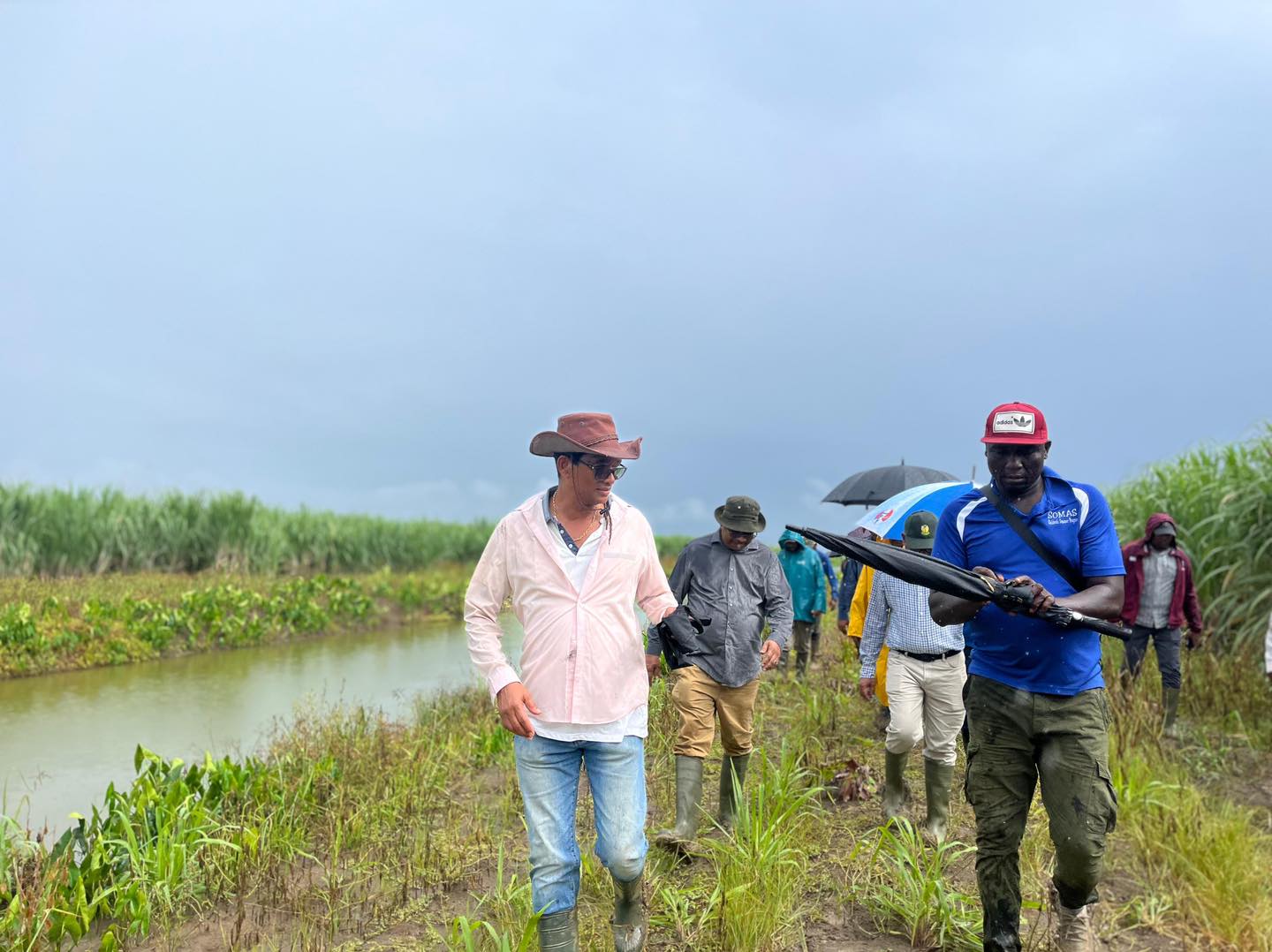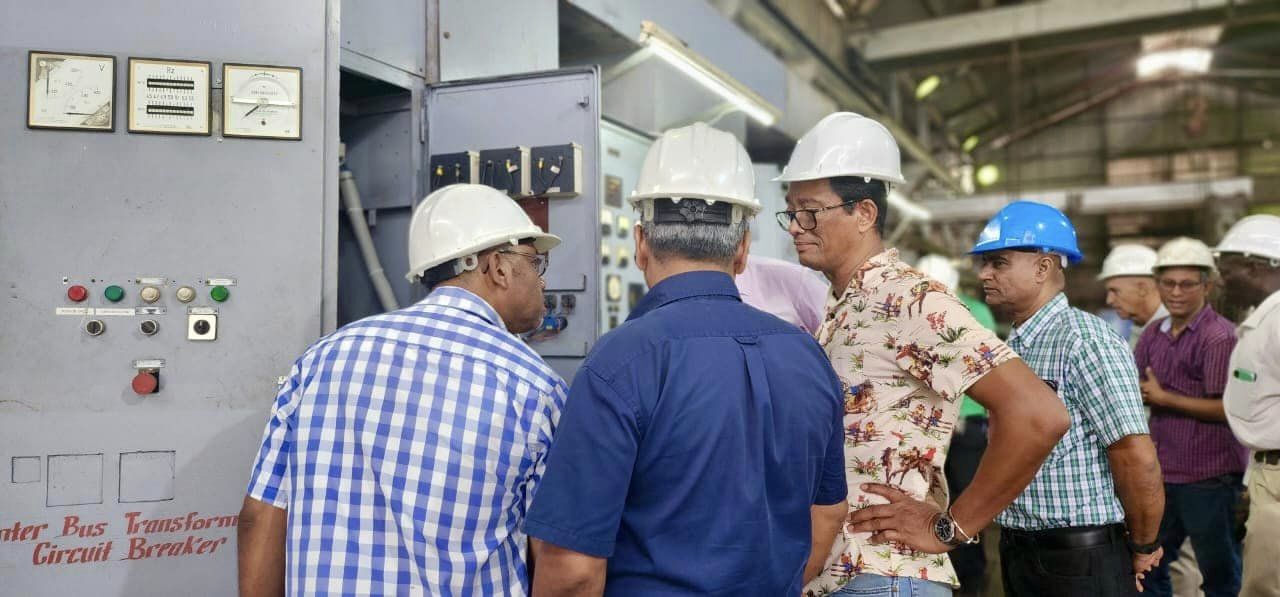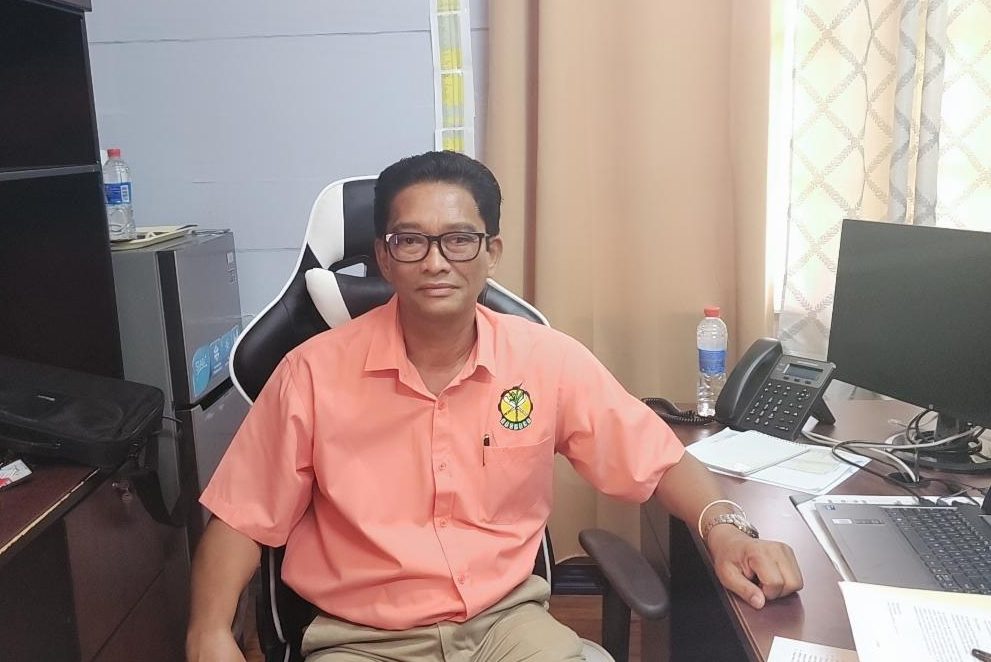GuySuCo’s first crop for this year has been the lowest ever recorded but with a plan for maximising mechanisation and using technology, newly appointed Chief Executive Officer Paul Cheong said that it will reach this year’s 100,000 tonnes target. Cheong was adamant that sugar is profitable and will be a positive contributor to Guyana’s development.
Not inclined to give the dismal numbers of the first crop production, Cheong said he wanted to focus on the positive as plans were forging ahead to make up and reach the set 2024 yearly target.
“The first crop was bad because of El Niño… It was one of the worst crops in history,” Cheong told Stabroek News in an interview late last month. He said that the low figures were not because of poor management but mainly poor weather and the Albion estate not working. “Albion didn’t work last crop and it affected efficiency because we had to move the crop to Rose Hall… Cane deteriorates with time and you get poor recoveries,” he said.

There was a major fire at the Albion Estate on February 3 this year, he recounted, as he pointed out that it resulted in extensive damage to the bus bar that housed the 4MW turbine alternator control panels. A 2.5MW control panel and interbus transformer panel and switch gears were also damaged. However, Cheong said that by the end of March they were rebuilt and testing showed no adverse effects. He informed that “full load testing with the entire factory operational will be done on the commencement of the crop. We don’t foresee any difficulty. Despite the fire, we were able to grind all of Albion’s cane at the Rose Hall Factory.”
With 8,179 persons in the corporation’s employ, he said that “there are 5,368 field workers out of an establishment of 7,600.”
Given the 2,232 persons deficit, he said that the corporation has intensified mechanisation to help mitigate this. And mechanisation, he underscored, was a big part of the future for GuySuCo as there are plans to adapt the industry so it can be developed to meet the changing global times.

“GuySuCo has no choice but to have its cultivation, in keeping in line with other sugar producing countries,” he reasoned. “The appropriate machines and equipment are used and 40% of GuySuCo is mechanised. Not included in this 40% is Skeldon, with 5,000 hectares fully mechanised.”
Given that President Irfaan Ali has spoken about cultivating more cane at Skeldon, Cheong was also asked a number of questions about that factory during the interview.
Back in May of this year, and stressing that his government continues to work to build the sugar industry by modernising the fields, Ali had said, “5,000 hectares here in Skeldon we are going to put back into production, whilst we are doing that we will be opening up opportunities for more than 50,000 acres of new land so that we can have new land available for our farmers, we are investing in that.”
Asked about the reopening and if it was not the case that this was a pipe dream, Cheong told this newspaper, “We have begun cultivation at Skeldon for the long term. Simultaneously, we are evaluating the factory to determine the best option based on new technology and what we already have available to us.”
Additionally, he expressed, “Yes, Skeldon’s reopening is a decision taken. The estate commenced planting of seed came using 5.0 hectares and will continue in the second half of this year.”
The new CEO expressed confidence that with him as head of the entity and effectively utilising the staff he has, GuySuCo can be viable. He said that it was not a pipe dream because he brings with him significant experience in both sugar cane production and factory processing.
This is because, according to him, his family were private cane farmers that once supplied the Versailles Estate and he has experience in many fields, from cutting and harvesting cane to treating the plants.
“I have been involved with cane since boyhood. I was a cane farmer and one of the largest cane farmers on the West Demerara. My family used to supply cane…,” he stated.
He also contended that, “Historically, sugar has done a lot for Guyana as a country, and sugar still has a place in making a contribution” and “I am confident that it is still viable or else I won’t be here.”
Cheong said that key in having optimum performance, workers have to be motivated and he noticed that they were “not being motivated” and that was why he made it his duty to visit the estates and have talks with employees of all areas. “That is why I have been going around and talking to everybody,” he said.
“The field operation is critical. The yield per hectare is not up to target. We have to work on strategy and yield per hectare about 80? right now it is 52 and sometimes it was as low as 30,” he said.
“Fertiliser is also big, so is managing weeds and getting the right type of weedicide and ensuring that fertiliser is distributed to crops in time,” he added, because, according to Cheong, “sometimes the plants get the fertiliser late. So it is a chicken and egg story and we are working, in the short term, to fix the gap that we have.”
He said that plans are also in the making to ensure that factory processing is efficient. “The other thing is that we have to work on the factory to get it more efficient. Cane, from the time you burn it, it starts to deteriorate. So we have to reduce the burning time. Sometimes we take 72 hours to burn the cane. Recovery depends on the amount of cane you take to make a tonne of sugar. We want to bring down the tonnage of cane it takes to make a tonne of sugar,” he explained.
“Also, the factory has to work continuously. What is happening is that the factory works a maximum of 70 hours when they can work up to 150 hours. Then you run into a problem with bagasse. Our plan is grind, at all the factories, a minimum of 130k. If we get the factories efficient, we can improve our recoveries and reduce our cost,” he added.
He said that the government’s wishes for the sugar sector was not impossible as many critics may say, since like any other produce, once managed properly sugar can be viable.
Cheong believes that his experience will ensure that after one year, there will be visible improvements.
“As I was telling you, my family used to supply Versailles with sugar cane. So I know about sugar,” he said.
On the factory side, Cheong said that he worked at Beharry’s Factory, “so I know about production and production management. I am not coming in as some green dunks, as some people might think. When we planted, we used to get 120,000 tonnes per hectare,” he added while pointing out some of the current sugar workers at GuySuCo used to work with him.
He said that the welcoming reception by staff at GuySuCo has been “great” and that this newspaper should not just take his word for it but can ask random staff. He believes that key to the effective running of any organisation is employees’ well-being and he will ensure this in his new role.
Cheong said that he doesn’t manage GuySuCo from the chair in his office, “I is put on meh long boots and go out in the field with the guys”.
The on-the-job oversight, he believes, will see GuySuCo’s gradual transformation to an entity that all Guyanese will once again be proud of.






